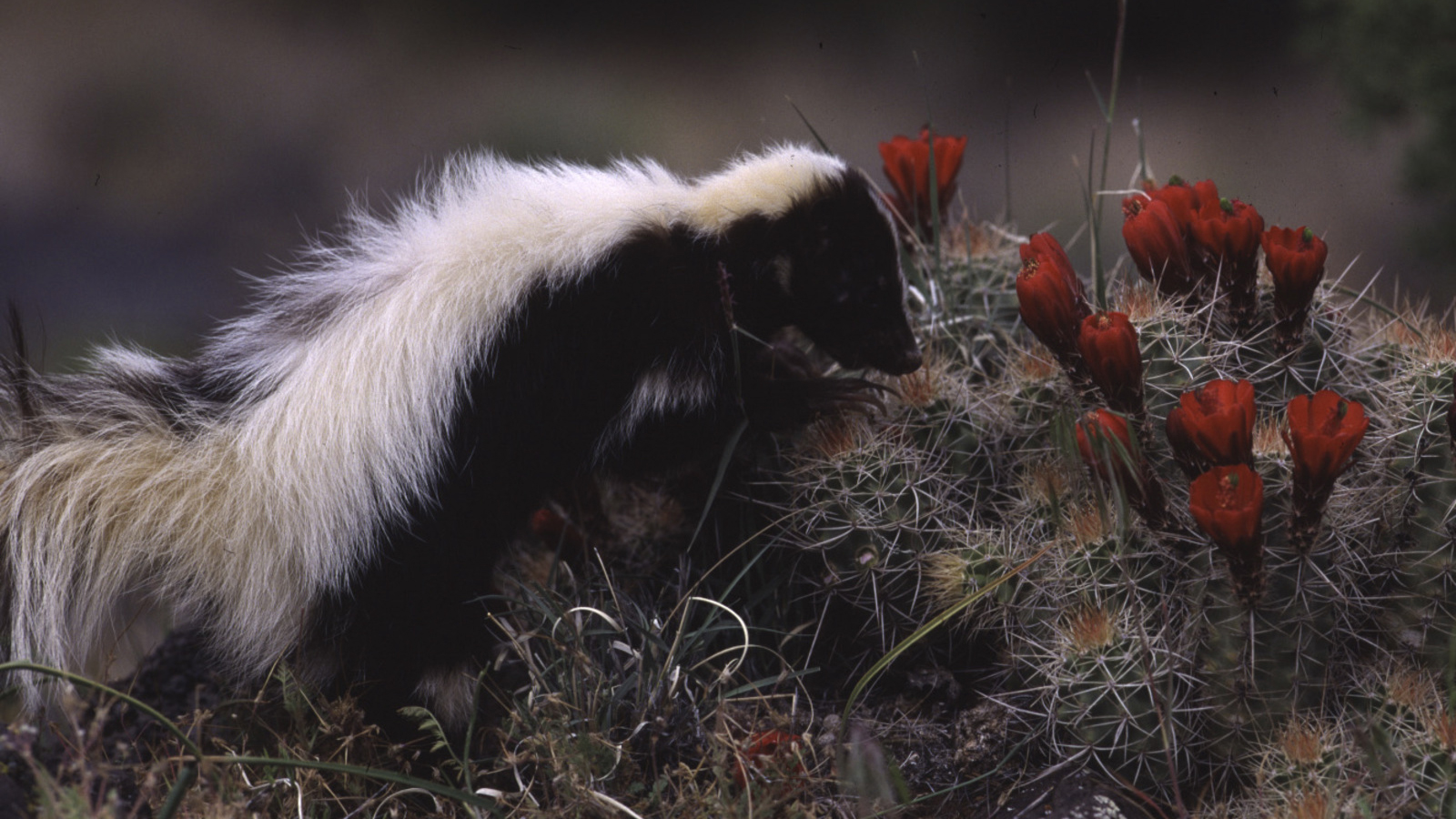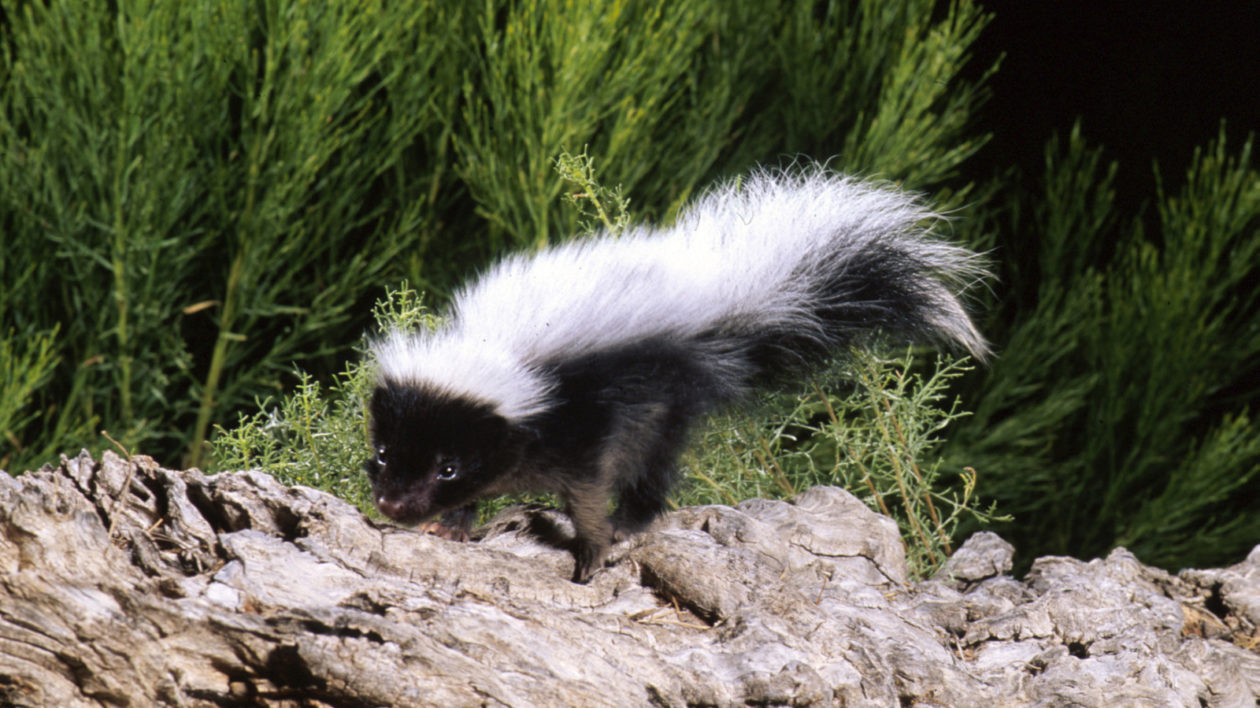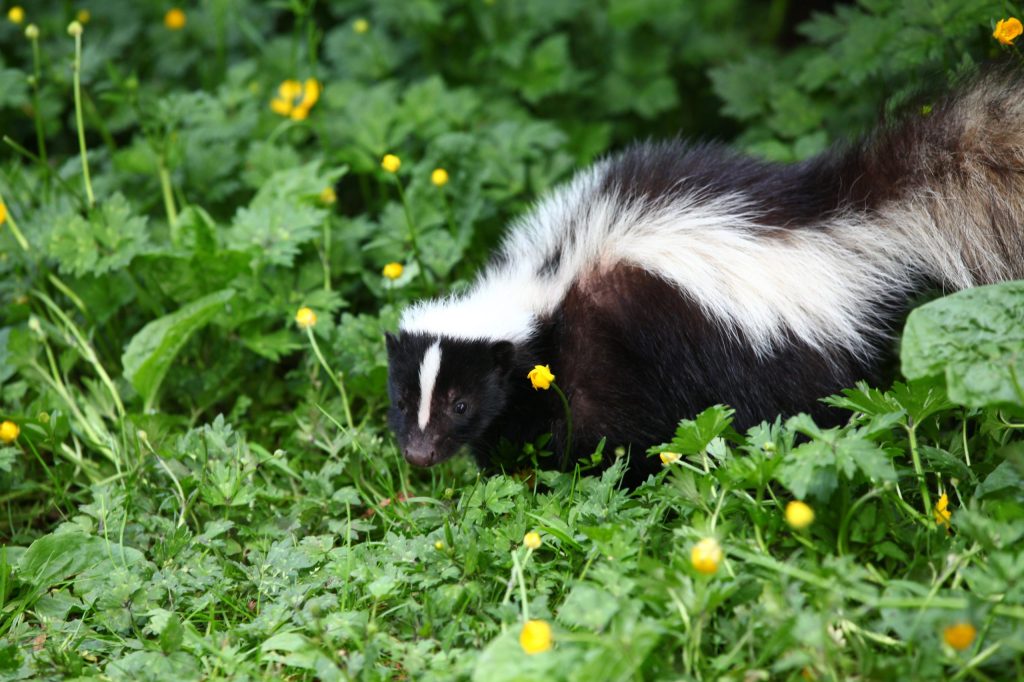On my drive to work this morning, I caught an unpleasant whiff of striped skunk several times. For the past week, skunk musk has assaulted my nostrils with increasing regularity. Perhaps you’ve noticed the same thing.
No, there isn’t a sudden population explosion of skunks. It’s all tied to their behavior. There are indeed times of the year when you’re more likely to smell a skunk. Here’s why.
Striped skunks are solitary, nocturnal critters. Despite thriving alongside humanity, they generally stay out of sight and out of mind. Given their propensity for spraying musk when threatened, you might think – given the high population likely living near you – you’d smell them all the time. Skunks spray as a last resort, and their survival depends on them being somewhat secretive.
But at times, they become very noticeable – sometimes due to their behavior and sometimes due to ours.
Striped skunks give birth to a litter of young, called kits, in the early spring. The kits are born naked, blind and helpless. The mother skunk goes out hunting and foraging and brings food back to the den until the skunks are two months old. Then they start joining her on forays, learning to dig insects and perhaps locate your garbage.
Being solitary, it is soon time for the young skunks to disperse. Depending on where you live, that’s right about now. So there are lots of young, relatively inexperienced skunks roaming around.

As I think back on skunk encounters, I’m struck by how often I have encountered them in August and September. I recall the night as a youngster I heard some rustling in our backyard. I led my mom and brother on my first of many night safaris. Suddenly a rather perturbed skunk appeared in my flashlight beam. I turned and ran, nearly knocking my mom over — and leaving my light-free family members to face the skunk in the dark. I still hear about my cowardice to this day.
Still, young skunks find themselves in much bigger trouble. The human environment offers no shortage of food: unattended pet food, garbage and litter, grubs and other insects, house mice, backyard poultry and their eggs, and other delicacies. Some skunks even specialize in bee hives, with mothers teaching young techniques for effectively extracting honey.
Suburbia is filled with potential den sites, with spaces under sheds, decks and homes providing ideal skunk condos.
This seeming skunk utopia comes with risks. The first is dogs. While coyotes, badgers and other predators avoid skunks, dogs have not gotten the memo. They attack skunks with abandon, leaving you to douse them with tomato juice or other concoctions that won’t work. (Interestingly, one suburban predator that successfully targets skunks is the great-horned owl. One notable owl nest contained nearly 60 skunks!).
An even bigger problem for skunks is roads. Skunks possess excellent senses of smell and hearing, but have poor eyesight. They are poorly equipped to deal with a car going 35 miles per hour.
Right now, a lot of young skunks are dealing with dogs and cars for the first time. You will smell the results.

There’s one other time of year when you’re more apt to smell these animals. That’s February, the mating season. Male skunks are fighting. Female skunks may be shooing away males they don’t want to mate with. All this stressful activity causes some musk to be deposited. It’s not as strong as you will find along the road: you might detect a slight skunky aroma emitting from under your shed in February. That’s from skunk activity.
You may not have even realized a skunk was living under your shed until this point.
The rest of the year, the most noticeable sign is when they dig in your yard. They leave small, circular holes around the yard. But they’re ridding your lawn of grubs.
Despite their bad reputation, striped skunks are actually low-key, low-maintenance neighbors.
Just keep an eye out for skunks on the road the next few weeks (actually, it’s a good idea to drive with wildlife in mind at any time of year). Tend your dog, your garbage and your chickens (also a good idea). And if you go out on a night safari in your neighborhood, make sure the whole family has flashlights.




Excellent article, I enjoyed it. Skunks are the not the devils they get portrayed to be. Many people believe every skunk is carrying rabies and this is simply not true. I actually like them except when they get stinky!
How do you try and get rid of them from your property? Is there some odor they don’t like?? They are living under my barn which has a stone foundation that they easily get around!
Matt:
You are so correct; in fact we saw what we believe was a young’un last night. Heshe must’ve been out foraging around a dead tree in the yard. Whenever possible we leave the limbs and trunk when we absolutely have to “cut”. We are in NE Tennessee.
Enjoyed the story and we wondered what there call was like; ever now and again we hear a sort of high pitched squeal when it seems two of them encounter each other. Pretty sure it isn’t raccoons.
Tks for such an interesting and amusing story
I have a couple of small young skunks living under my side porch. I see them occasionally and they are the CUTEST things!!!! I feed my old cat on that porch and I call the cuties my “cleanup crew”…. The poor cat has such trouble eating that he makes a mess, so the little guys clean it all up. I would love to cuddle them but……. Actually I have not noticed any smell at all!! I’m enjoying them a lot……
I recently put up a bird feeder with dried mealworms, and I haven’t seen the birds going for it but someone is eating it when I’m not looking. I started wondering about skunks, although I haven’t smelled them. What do you think?
Not all of us find the smell of sunk to be objectionable. Any odor that is overwhelmingly strong is repellent, but I find a light whiff of fresh skunk to be a complex and rich aroma. The interesting qualities of the odor degrade after a day in the hot sun on the roadside, but try giving the smell a chance next time you encounter a waft of skunk on the breeze before going straight to, “Ewwwww”.
In Maine we lived in a house surrounded by vegetation and skunks (thanks to a neighbor’s garbage). We ignored them, and they ignored us. We could hear them rustling in the flower beds as we walked by, and I once stood about six feet from two skunks chasing each other around a tree (probably in February…). I watched until I got bored, and then I walked away…totally ignored. The only problem was when one decided to sit on our stoop, and we had to sit in the car until it decided to leave. I never once got a whiff of musk in the five years that we lived there.
Riddle me This, why is it I love the smell of skunks?
So what do you suggest to get rid of skunk smell ?
Great article! Thank you. My skunks must have gotten used to my pet less 4 acres and I can always tell when they have been around… Not odor but thier digging! Certain areas year after year that can not be attributed to another critter.
Excellent article. We learned a great deal about Skunks. We once a had a friend that had skunk as a pet, she lived in New England ( Connecticut). It got loose outside in the yard. When she saw this skunk she was not sure if it was her pet?? A young boy, about 8 years old came up to the skunk and stamped his foot and when he didn’t react, he said, he’s not for real.
I’m often amazed when the same neighbors who toss dinner scraps, fruit and vegetables onto a “compost pile” complain of skunk, opossum and raccoon “invasions”.
Seems my 5 year old Chihuahua Milo thinks they are something that has come to play with him. He has had at least 7 encounters with the smelly “cats”. 3 of them this summer alone. He doesn’t seem to equate them with the discomfort, and smell, as well as the baths late at night. Although the peroxcide, baking soda, soap works we found a product called Skunk Odor Remover by Natures Miracle is ver effective as well.
Thanks Matt. It’s like you’ve read my mind. We’ve been encountering skunk scent often lately and I was wondering what was up. My dogs have always confronted skunks at all the wrong times – as if there are good times – like when someone is dog sitting for us or after an already drama filled night when all I wanted to do was sleep instead of standing in the snow in sub zero weather pouring tomato juice over a perplexed dog.